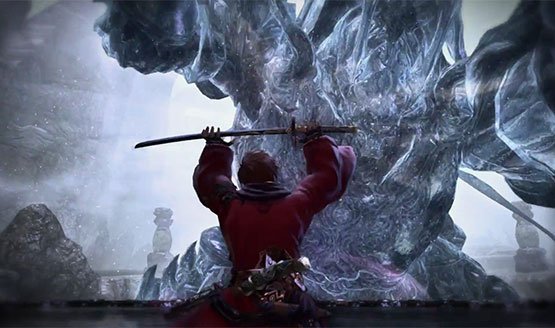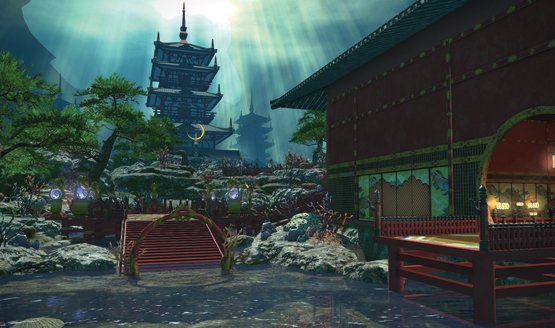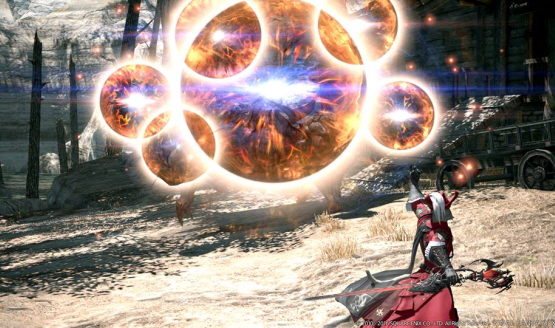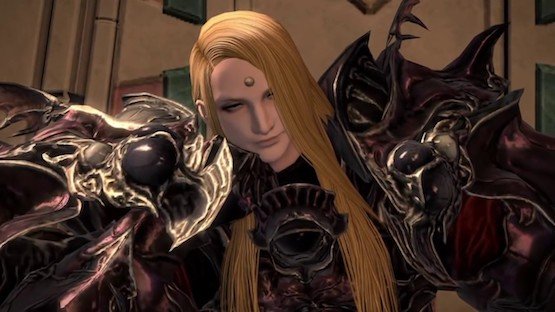Few MMOs have wound up being a success after a rough start, but strong writing and great updates have made Final Fantasy XIV more popular than ever. The game’s latest expansion, Stormblood, released last year, and the game is still going strong in 2018 thanks to recent updates. I got the chance to speak with lead main scenario writer Natsuko Ishikawa and English localization lead John Crow at PAX East 2018.
I asked Ishikawa about her experience writing for MMOs compared to standard role-playing games, and learned about the game’s translation process from Crow.
Tyler Treese: So I guess my first question is more general in nature. Can you talk about the challenges of writing a MMO versus a standard RPG. What changes?
Natsuko Ishikawa, Lead Main Scenario Writer: I actually come from a background of writing for standalone RPGs, but I think there’s not really much of a difference between writing for a standalone RPG versus an MMO in that we’re trying to make sure that the story is exciting for the players.
John Crow, English Localization Lead: I think from a localization perspective, it does get a little bit more complicated. When working on a standalone package title, there’s a distinct start and end to it, and you can focus on, you know, developing the story and localizing it to a degree. But then if you have constant updates, you may have different elements that end up getting a more of a focus on something else. So if you put a lot of care and effort into writing like one character, one storyline, and then something else becomes the later down the line, it may be a little bit more complicated.
Zenos is a really memorable villain. Can you talk about writing for him and how you feel about his reception? He’s become quite popular.
Ishikawa: In our previous expansion Heavensward there was the enemy character, the knights of the Heavens’ Ward, and there were so many of those characters that we didn’t have the opportunity to depict the different characters that were involved, and what they had went through. You defeat them and they’re gone, so with Stormblood we made sure that the character of Zenos, we wanted to bring out his strength, of course, but also what is going on with his head as well. So, that it’s more clearly depicted, and easier to recognize through the gameplay in the scenario. that you lay on top. As a result of that we have this character, of course he’s supposed to be an enemy, but you relate and become emotionally invested in that character. It was definitely well worth the effort.
Crow: Like she said we made a more concerted effort to ensure that Zenos engages the player very early on in the story at different points so that you had a clear idea of who he was and what he was about. So that by the end of the story, when you got to it, there was a definite investment and it wasn’t like the issue we had before where there were so many different characters in the knights of the Heavens’ Ward for that. You never even got to know their names much less. The personalities are different traits. I’m not too surprised that people like to, I mean, yeah, well we did want him to be like evil and bad and you know, not have very many redeemable qualities. I think any good character has to have some humanity at the heart of them. There’s some complexity so that even if you don’t agree with what they’re doing whatsoever on some emotional level you understand.

You kind of touched on this from a localization aspect, but can you talk about the challenges of crafting a story that sort of never ending. You’re always adding on to the narrative of Final Fantasy XIV, so what’s it like like to not have a defined end?
Ishikawa: One of the things that we do take great care of is you don’t want to just throw in a character, an enemy character, that is just simply stronger than [what was in the last expansion]. I say that because I just want to make sure that what enemies or encounters you face, that it actually ties into what you had experienced. That’s what we’re aiming towards in the future as well. So to have like a cohesive progression throughout the year.
Crow: Yeah, I mean the different antagonists and villains that you encounter over the course of the story should, shouldn’t challenge the player in the exact same way. Just, you know, 20 percent stronger or something like that. You need to put different challenges in front of them to challenge them in different ways. We do focus primarily on the characters that are fighting battles and stuff like that, but there are also other forces at play. Antagonistic forces that feature in the story itself, but you can’t kill all your problems so to speak. That’s another thing, at least for the course of the story, if not, you know, the gameplay itself that we try to make an effort to work in for variety sake.
In Stormblood‘s story, one of the most interesting parts is that it shows off different parts of the in-game world. What goes into making sure the different regions of feel unique from a story perspective?
Ishikawa: With Final Fantasy XIV, a lot of the times the narrative progresses through conversations with the different people that live within that realm. So we make sure that we have different areas with people that exist within those locales, that have a perspective of their own area and players get to interact with that. Of course, visually speaking you can tell that it’s a different area, different region, and there’s a culture that’s established within those different areas. But on the people that reside in those different areas have their own perspective of what their world is. So, depicting that is one of the important aspects in terms of scenario writing.
One thing unique to MMOs is that players are creating their character, and while the Warrior of Light has been defined by what has happened in the story so far and the events they’ve gone through, your writing is for a game without a defined protagonist. Can you discuss what that means for your story and how you have to approach that?
Ishikawa: Yeah, it’s definitely really difficult to sort of approach that. Even within the development team, [we’ve] faced different challenges. One of the toughest challenges that we face is whenever aspects of romance or a love relationship is involved. It’s difficult to incorporate that sort of romantic aspect since we don’t know exactly how each player’s personality is like, and that’s definitely a challenge. One that I don’t think been we’ve been able to sort of tackle that topic or aspect as a sort of main focal point in Final Fantasy XIV.
Crow: Honestly, I don’t think we can. I mean if you have a single player game where you have the story again with the defined start and end, you can focus more resources on having branches. Like okay, there’s a set number of characters you can actually develop a relationship with this person. I mean, you have that in a lot of different single player games by different developers, but since we have to keep the story continuing for years and years and years, if we gave people the option to develop a relationship with this one character, there would be cascading changes through the years, at which point it’s like, well now we have to continue to write different storylines and dialogue branches for now you’re romancing this person, this person, this person, this person, and this person. I mean cause every single new character, every single new cast of characters that we introduced with the new expansion. Oh, “Well, they have to be a romanceable , character.” I mean I understand the feeling, but it’s already a challenge enough as it is to try to write a story without people thinking, oh, I would never do that. I would never do that. So. Well you kind of have to for the story to complete. So, romance for the player characters? Probably not. NPC characters with NPC? Okay, yeah.

Stormblood has been very positively received for its story, especially Zenos like I touched on it earlier. Can you talk about how satisfying that is as a writer to get that positive feedback on it, especially since like you talked previously, learning from Heavensward and you know, putting more resources into the villain.
Ishikawa: Definitely. The positive reception is wonderful. It’s great motivation. It really encourages us. That being said, we’re constantly working, so by the time we receive word on the expansion launch we’re already on the next update. It’s interesting because we’re only prompted to look back at work after we already know what we’re doing next.
Crow: I mean, I don’t think that you receive the feedback, and you’re like, “Oh, now let’s change everything to feature the person.” No, we already had a storyline set. It’s less, “Oh yay!” and more “Oh, thank God, thank God we’re already going to do something with this character or not do something with this character.” But yeah, I think it was extremely satisfying.

Final Fantasy XIV, I feel it handles nostalgia really well. There are great throwbacks to previous games in the series and recently Kefka was added as a boss encounter. As a writer, how exciting is it to get to use these iconic characters from time to time?
Ishikawa: It’s very exciting. We love to feature these elements, but at the same time it’s also something that we’re nervous and apprehensive about. We all love Final Fantasy, even in the development team, so we have this feeling of we have this character or an element we want to introduce, but we don’t want it to be something that we would not be satisfied with or something not pleasant with us.
Crow: It’s a tremendous sense of responsibility every single time where you don’t want to ruin someone’s nostalgia or someone’s memories and stuff like that. And then when you’re dealing with a character that it’s not more obscure reference, but the more obvious it is like, like you said. With Kefka it was like, “Oh, well then we also need to look up all the old lines, everything they ever said and be like, ‘oh, are we going to use this verbatim?’ ‘Are we going to tweak it?'” And so forth. So there’s also that element.
I wanted to ask about the translation process. How often do you directly communicate. Cn you talk about the overall process of that?
Crow: We work alongside the team. I mean she sits not too far from me anyway. So, at any time when you get the text at various state of being finalized or not. I mean that’s the first thing to, depending on the schedule we may need to start working on earlier drafts that hadn’t been proofread or even like approved by [director Yoshi-P] because he reviews everything as well. But there’s a read-through period, but each translator has their own approach. You know, some people might do multiple drafts, some people might start with something that y’know closer to the Japanese and revise that constantly. Some people might go for that one perfect draft, and try not to tweak it too much. But you know, at any point if we come across something where we’re at all unsure about, either the intention of this line or the lore behind something, you know, we can always go directly to the scenario team and be like, “Can you clarify this? Can you tell me like what are you going for here or what does this mean?” and get that information so that if we do decide to take this in a different direction, that’s with full knowledge of what the source is trying to do.
There’s a lot of misconceptions around a localization, and especially when it comes to literal translations. I mean it seems like you would address that within the team by going to them for understanding the lines. Can you just talk about how frustrating it is, if it even is frustrating, when you see people criticized for literal translations when you’re trying to get the original point across?
Crow: I mean I understand the perspective coming from. I mean it gets back to fundamental translation and localization. I mean there’s people that say that the words, the structure of the grammar, there is inherent meaning and intention there and by sticking as close to it as possible, you’re being true to that. But I think that for us, the, the main concern is there’s a couple of different principles, but we went to produce something that sounds natural and flowing in our target language. Be that English, French, German, whatever. If it doesn’t sound like it was written originally in that language, then that’s a problem. We want something that’s a narrative that can compete on the level of something developed in that original language. So I know that so many people compare Japanese games to Japanese games, but we don’t want to compete with only Japanese titles because we want them to be with everybody’s games, with everybody’s stories.
And so with that in mind, I think you need to take a step back and consider, what is any particular line, any particular word? What is it, a particular story going for and not get caught up in the structure. That said, people are free to criticize. There’s no one right way to do what we do and I would encourage them to keep up with their studies and their own translation. We’re always hiring. We could always use more talented, motivated people.

Do you have any words for fans and for their support?
Ishikawa: First and foremost, with Stormblood being launched last summer. Moving into 2018, we were able to update on my major project date 4.2, and so we wanted to express our thanks to the fans that love Final Fantasy XIV throughout all of these [updates]. We would love to continue having the sort of relationship with the players and we want to continue updating the Final Fantasy XIV experience together with our players and so invite your friends to jump on as well. If somebody has lapsed out, please invite them back into play with you. We also have a free trial available. If you have not had a chance to play Final Fantasy XIV, we’d love for more people to come and join us.
Thank you so much for your time.
A major thank you to Square Enix PR for setting up this interview and to both Natsuko Ishikawa and John Crow for their time!








